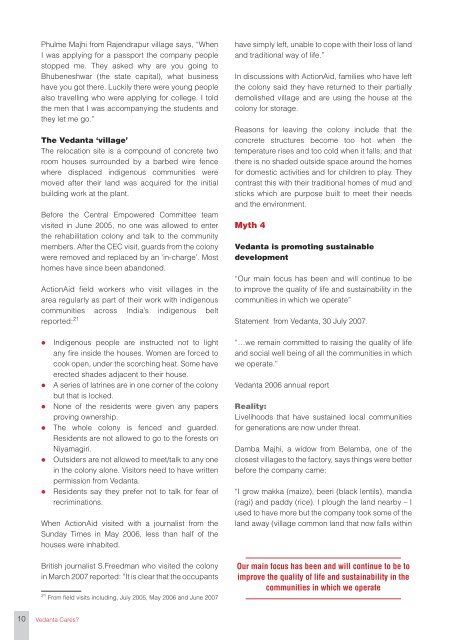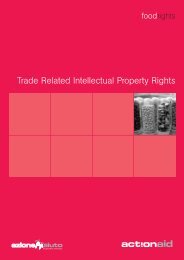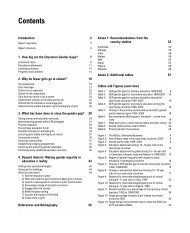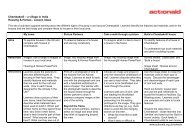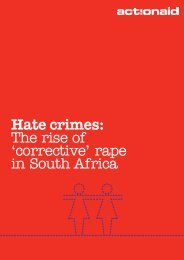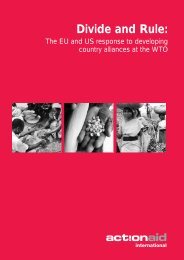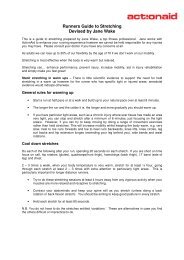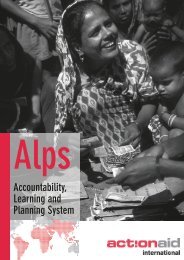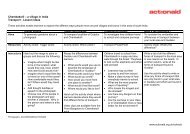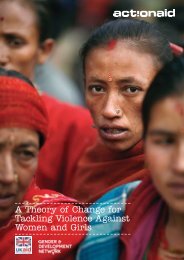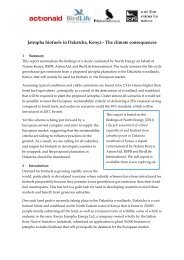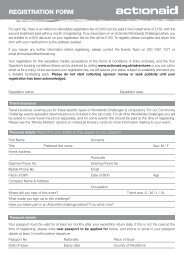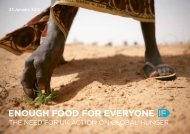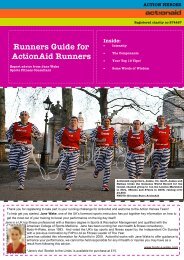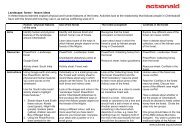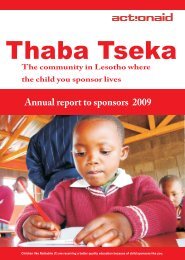Vedanta Cares? - ActionAid
Vedanta Cares? - ActionAid
Vedanta Cares? - ActionAid
You also want an ePaper? Increase the reach of your titles
YUMPU automatically turns print PDFs into web optimized ePapers that Google loves.
Phulme Majhi from Rajendrapur village says, “When<br />
I was applying for a passport the company people<br />
stopped me. They asked why are you going to<br />
Bhubeneshwar (the state capital), what business<br />
have you got there. Luckily there were young people<br />
also travelling who were applying for college. I told<br />
the men that I was accompanying the students and<br />
they let me go.”<br />
The <strong>Vedanta</strong> ‘village’<br />
The relocation site is a compound of concrete two<br />
room houses surrounded by a barbed wire fence<br />
where displaced indigenous communities were<br />
moved after their land was acquired for the initial<br />
building work at the plant.<br />
Before the Central Empowered Committee team<br />
visited in June 2005, no one was allowed to enter<br />
the rehabilitation colony and talk to the community<br />
members. After the CEC visit, guards from the colony<br />
were removed and replaced by an ‘in-charge’. Most<br />
homes have since been abandoned.<br />
<strong>ActionAid</strong> field workers who visit villages in the<br />
area regularly as part of their work with indigenous<br />
communities across India’s indigenous belt<br />
reported: 21<br />
• Indigenous people are instructed not to light<br />
any fire inside the houses. Women are forced to<br />
cook open, under the scorching heat. Some have<br />
erected shades adjacent to their house.<br />
• A series of latrines are in one corner of the colony<br />
but that is locked.<br />
• None of the residents were given any papers<br />
proving ownership.<br />
• The whole colony is fenced and guarded.<br />
Residents are not allowed to go to the forests on<br />
Niyamagiri.<br />
• Outsiders are not allowed to meet/talk to any one<br />
in the colony alone. Visitors need to have written<br />
permission from <strong>Vedanta</strong>.<br />
• Residents say they prefer not to talk for fear of<br />
recriminations.<br />
When <strong>ActionAid</strong> visited with a journalist from the<br />
Sunday Times in May 2006, less than half of the<br />
houses were inhabited.<br />
British journalist S.Freedman who visited the colony<br />
in March 2007 reported: “It is clear that the occupants<br />
21 From field visits including, July 2005, May 2006 and June 2007<br />
have simply left, unable to cope with their loss of land<br />
and traditional way of life.”<br />
In discussions with <strong>ActionAid</strong>, families who have left<br />
the colony said they have returned to their partially<br />
demolished village and are using the house at the<br />
colony for storage.<br />
Reasons for leaving the colony include that the<br />
concrete structures become too hot when the<br />
temperature rises and too cold when it falls; and that<br />
there is no shaded outside space around the homes<br />
for domestic activities and for children to play. They<br />
contrast this with their traditional homes of mud and<br />
sticks which are purpose built to meet their needs<br />
and the environment.<br />
Myth 4<br />
<strong>Vedanta</strong> is promoting sustainable<br />
development<br />
“Our main focus has been and will continue to be<br />
to improve the quality of life and sustainability in the<br />
communities in which we operate”<br />
Statement from <strong>Vedanta</strong>, 30 July 2007.<br />
“…we remain committed to raising the quality of life<br />
and social well being of all the communities in which<br />
we operate.”<br />
<strong>Vedanta</strong> 2006 annual report<br />
Reality:<br />
Livelihoods that have sustained local communities<br />
for generations are now under threat.<br />
Damba Majhi, a widow from Belamba, one of the<br />
closest villages to the factory, says things were better<br />
before the company came:<br />
“I grow makka (maize), beeri (black lentils), mandia<br />
(ragi) and paddy (rice). I plough the land nearby – I<br />
used to have more but the company took some of the<br />
land away (village common land that now falls within<br />
Our main focus has been and will continue to be to<br />
improve the quality of life and sustainability in the<br />
communities in which we operate<br />
10<br />
<strong>Vedanta</strong> <strong>Cares</strong>?


